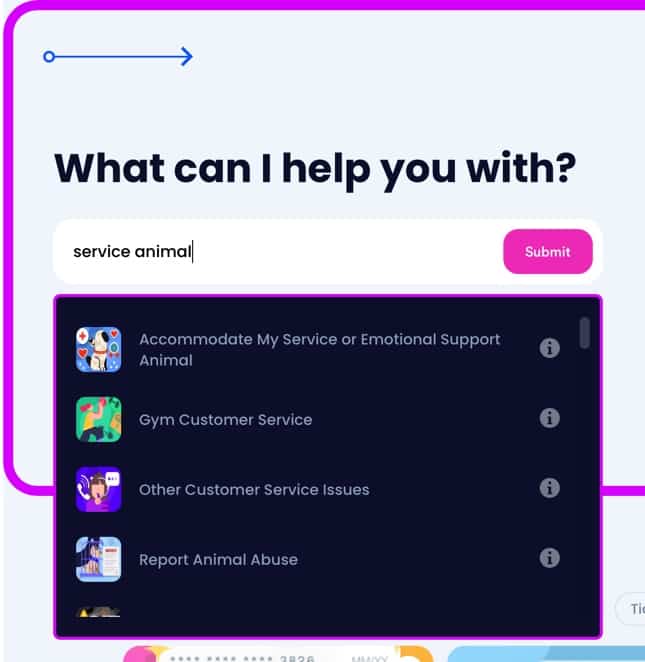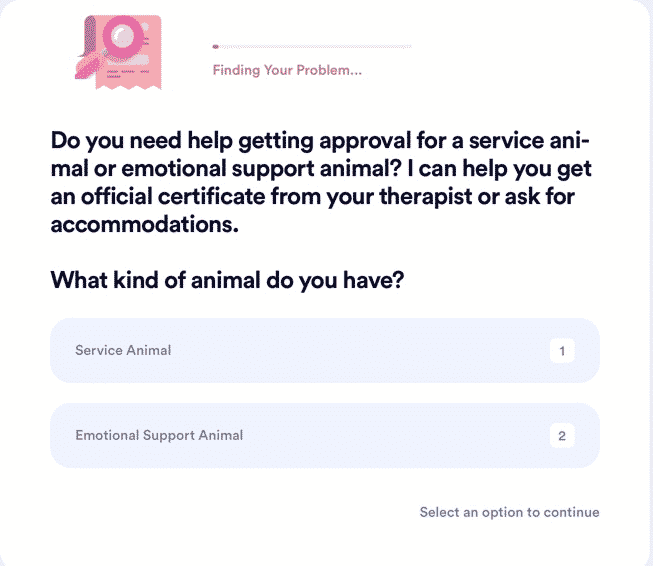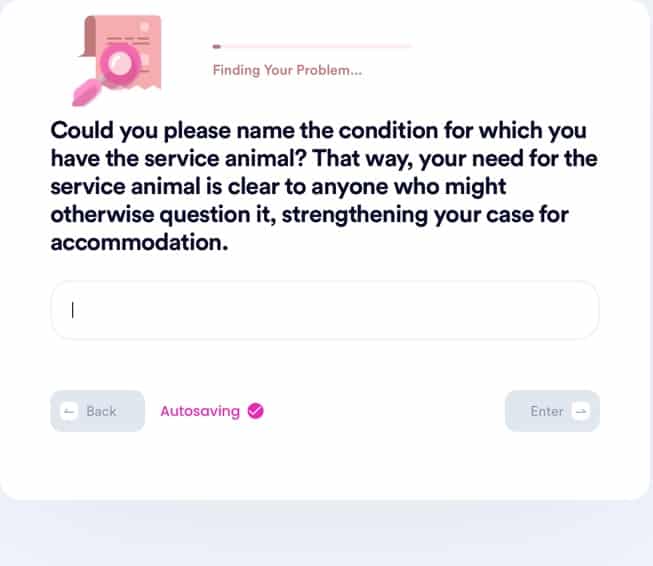Alabama Laws on Emotional Support Animals
There are more than 222,000 Emotional Support Animals (ESAs) in the US. Clearly, the need for them is growing. ESAs can be prescribed by a mental health professional to those with certain psychological disorders, including anxiety, depression, and certain phobias.
Alabama public laws do not define what an ESA is, but they do not attempt to limit ESA owners' power either. No matter what, ESA owners are protected by the Fair Housing Act, which does include ESAs by name.
Landlords face heavy penalties under the law if they stop someone from living with a verified . However, they might need a little education on the matter if they are not aware of their duty under housing laws.
What Are Emotional Support Animals? What Alabama ESA Owners Need To Know
An emotional support animal is an animal – commonly a dog or cat (and rabbits, increasingly) – prescribed for the emotional soothing and relief they provide for those suffering from a mental or other health disorder.
- ESAs are not covered by the Americans with Disabilities Act (ADA) because they are not legally categorized as service animals.
- The result is that public places, airlines, and certain other venues are not legally required to allow an ESA the way they must allow service animals.
For the state of Alabama, the relevant code doesn't specifically include a definition for emotional support animals; however, it does use the phrase "emotional support" in a list describing what does not constitute a "service animal."
That's fine for those not seeking "service animal" status for their emotional support companion anyway. As noted above, freedom to live with your ESA – with a valid ESA letter – is nevertheless federally protected, and ESAs are allowed on housing properties (including campus housing) regardless of the property owner's policy on pets.
- Be careful to not use the term "service animal" when what you mean is "emotional support animal."
- In 2019, the state of Alabama criminalized that misrepresentation.
Beyond housing, you might wonder how good it is to have a verifiable ESA letter. While companies, including airlines, aren't legally forced to accommodate them, some of them choose to. Whether out of goodwill, image concerns, or some combination of the two, some businesses voluntarily extend the same consideration to ESAs as they do to service animals.
What Is an ESA Letter?
While service animals just need a certificate, ESA owners must get a signed letter from a licensed mental healthcare professional. The easiest way to get one is to ask your mental health care provider to write you one – or instead book an online appointment with a licensed mental health professional, who can provide an ESA prescription letter.
To be legitimate, ESA letters require:
- The license number of the physician or mental health professional
- An expiration date
- Issuance date of the letter
- The contact information for the author of the letter
Remember that you need the contact info for your qualified health care professional so that the landlord or airline can verify the letter.
Who Can Write an ESA Letter in Alabama?
There are many options when looking for someone to write an ESA letter.
| Who can write an ESA letter? |
|
Note that certain airlines only recognize certain professionals when verifying ESA letters. DoNotPay can help you identify these limitations according to which airline you are dealing with:
- American Airlines ESA Assistance
- United Airlines ESA Assistance
- Southwest ESA Assistance
Airlines can change their ESA letter standards at their whim. DoNotPay recommends getting your ESA letter from the most authoritative source whenever possible (e.g., a doctor instead of a nurse – see the boldface entries above), because we know that constantly shifting rules is the last thing you need to deal with when trying to fly with your emotional support companion.
How To Ask for an Emotional Support Animal
It really is as simple as asking your healthcare professional for an ESA letter. But you may wonder what qualifies you to get one. There are many conditions that qualify you for an ESA letter, but some of the most common ones are:
- Anxiety
- Psychiatric Conditions
- Autism
- Depression
- Social Phobia
- Panic Attacks
- Trauma
- Age-Related Cognitive Decline
It's best to talk with your health care professional about which of your conditions makes for the strongest claim – or if you should include multiple conditions.
How To Keep Your Emotional Support Animal With You in Alabama by Yourself
Once you have the ESA letter, you must learn how to use it in the most effective way. It can be helpful to have several "wet ink" copies of the letter – but in any case, make sure you have quite a few copies.
Keep the letter nearby at all times (like in your glove box, purse, backpack, etc.). When possible, preemptively communicate about it with the owners and key decision-makers at the locations you wish to bring your ESA. By identifying the condition – as clearly as possible – for which your companion animal was prescribed, your communication about the matter will be much more effective, and you improve the chances of accommodation.
For housing or airline purposes, contact them and explain that:
- You have a serious medical condition or conditions requiring an ESA.
- You have an ESA authorization from your medical or mental health professional.
- Respectfully inform them of the laws that protect your enjoyment of your medically necessary support animal.
It's important to stay calm, dignified, and well-spoken.
Housing Matters
When seeking housing, know in advance the kind of pushback they might likely give if they state a "no pet" or "no animal" policy. Though they are required to give equal housing opportunity, how will you know they won't just manufacture a reason to deny your application – or that they aren't scrutinizing you for "signs" that you are "lying about a disability?”
Since your need for an ESA amounts to revealing that you have a difficult mental condition, it raises the concern that you could be discriminated against for both the disorder and the ESA.
You might have the best success telling them about your ESA after they tell you – either in writing, or in front of witnesses – that your references are good, and they want to rent their property to you. They wouldn't be able to make something up to deny you, at that point.
Above all, aim to leave them with the impression that you are the most responsible and knowledgeable ESA owner-advocate they've ever met, your ESA letter is impeccable, and its author is highly reputable. Be respectful, but firm, as you explain the relevant laws. For instance, if they dismissively say that an ESA is not a service animal, non-defensively explain that you know that the ADA doesn't compel them to accept an ESA – but the Fair Housing Act most certainly does.
Be prepared to show them a highlighted copy, and have two witnesses with you; they might get the hint. Learn and memorize the key points of the Fair Housing Act. And be prepared to explain it to landlords in a confident way. Give them a chance to "save face," rather than be hostile, so that it is easy for them to back off – and so that you don't have to worry about reprisal.
Flying Without Harassment
With airlines, you are reliant to a large degree on their approval. It's in your (and your furry friends) best interest to learn what they need to feel good about it; i.e., that your animal is well behaved, well trained, and that your ESA letter is as legitimate as they come. Learn so much about it that you communicate about the matter with ease and confidence, and leave them with the impression that you successfully handle these matters often.
Sometimes, they thoughtlessly deny you at first just to screen out less robust claims. They might talk you into paying more (even with a very small animal). If you are certain that your need for an ESA is absolutely rock solid, and you speak well for yourself, it will show and they will be more likely to cut the red tape.
A Better, Automated Way
It can become exhausting to have the same conversation over and over about it, pleading your case, and getting upset (when the reason for your ESA is to reduce such feelings). Even though learning tactical communication and the law is definitely worthwhile, everyone needs some help sometimes. It's best to streamline the whole process and let DoNotPay go to bat for you. It will save you time, money, and mental distress.
By contacting landlords, negotiating with airlines and venues, and various other means, DoNotPay advocates on behalf of to bring them more freedom of choice. DoNotPay also helps people get service animal certificates for the strongest protection you and your furry friends deserve.
Next Steps for Emotional Support Animal Assistance (if You Can't Do it Yourself)
Since ESA approval is dependent on a case-by-case basis, it's going to require learning some exceptional communication and socialization skills.
For some people, social and communication difficulties are exactly what made them seek the relief of an ESA to begin with. The benefits of an ESA can seem taken away by all the headache and gum flapping about it.
A good support group, wiser for the combined experience, can be just what ESA owners need to be left alone. If requesting ESA accommodations on your own becomes more distressing than it's worth, it never hurts to seek the safety and mass influence of a strong social network.
The entire ESA community benefits when each one is able to achieve small victories along the way. Imagine if it was all streamlined for the highest possible success rate and with the lowest amount of exhausting discussion about it. With DoNotPay, that solution finally exists!
How DoNotPay can Help
Through our new Service and Emotional Support Animals product, DoNotPay can help you with all of your ESA-related concerns, including contacting your landlord about your ESA, asking airlines about their accommodation options, and finding the most affordable online ESA-letter service. Here’s how:
- Search "service animal" on DoNotPay.

- Select the type of issue you need help with, including contacting your landlord about your ESA/service animal, asking your airline about ESA options, or requesting ESA/service accommodations at other venues.

- Answer a series of questions about your current situation and the details of your ESA/service animal, so we can generate the best results for you.

And that's it! Depending on your issue, DoNotPay will generate a letter to your landlord and mail it on your behalf, contact the airline agency and get back to you with an answer, or send a letter to your mental health professional requesting an ESA letter.
If you are already experiencing loss or damage due to ESA-related harassment, it might be time for DoNotPay's small claims court services. The Send Demand Letters To Now product generates a demand letter to demand compensation, scouts out the right small claims forms, and provides a court script for if the landlord ignores the demand letter and forces you to obtain justice.
More DoNotPay Products for Your Pets
DoNotPay has other great pet-related products:
- Pet Custody Agreement
- Animal Control
- Pet Licenses
- Lost and Found Pets
- Animal Abuse Reports
DoNotPay assists in pet-related matters beyond ESA to help animal lovers in every way we can. But that’s not all you can do with the app.
What Else Does DoNotPay Do?
Learn more about how we can either teach you to solve the following issues yourself – or tackle them in full for you:
- Cancel Any Service or Subscription
- Obtain Airline Flight Compensation
- Get Better Hotel Upgrades
- And so much more!
Try it today!


